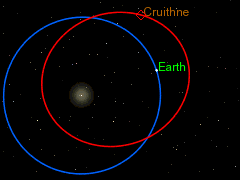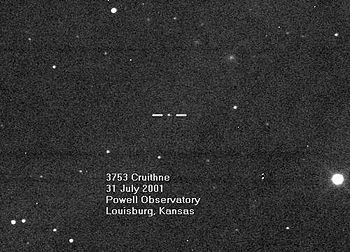Earth's Second Moon
Printed From: iAMGaming.com
Category: Off Topic Forums
Forum Name: I'm So Smart
Forum Discription: Educate us on something you know, or make a request
URL: http://www.iamgaming.com/forum/forum_posts.asp?TID=7961
Printed Date: 27 Apr 2024 at 3:37pm
Software Version: Web Wiz Forums 9.72 - http://www.webwizforums.com
Topic: Earth's Second Moon
Posted By: Zellot
Subject: Earth's Second Moon
Date Posted: 16 Feb 2012 at 8:27pm
|
ok this isn't really our second moon but it quiet interesting to know http://en.wikipedia.org/wiki/3753_Cruithne" rel="nofollow - http://en.wikipedia.org/wiki/3753_Cruithne
3753 CruithneFrom Wikipedia, the free encyclopedia
3753 Cruithne ( The name http://en.wikipedia.org/wiki/Cruthin" rel="nofollow - Cruithne is that of an early medieval people of Ireland.
[ http://en.wikipedia.org/w/index.php?title=3753_Cruithne&action=edit§ion=1" rel="nofollow - edit ] DiscoveryCruithne was discovered on October 10, 1986, by http://en.wikipedia.org/wiki/Duncan_Waldron" rel="nofollow - Duncan Waldron on a photographic plate taken with the http://en.wikipedia.org/wiki/UK_Schmidt_Telescope" rel="nofollow - UK Schmidt Telescope at http://en.wikipedia.org/wiki/Siding_Spring_Observatory" rel="nofollow - Siding Spring Observatory , http://en.wikipedia.org/wiki/Coonabarabran" rel="nofollow - Coonabarabran , Australia. The 1983 apparition (1983 UH) is credited to http://en.wikipedia.org/wiki/Giovanni_de_Sanctis" rel="nofollow - Giovanni de Sanctis and http://en.wikipedia.org/wiki/Richard_M._West" rel="nofollow - Richard M. West of the http://en.wikipedia.org/wiki/European_Southern_Observatory" rel="nofollow - European Southern Observatory in http://en.wikipedia.org/wiki/Chile" rel="nofollow - Chile . It was not until 1997 that its unusual orbit was determined by http://en.wikipedia.org/w/index.php?title=Paul_Wiegert&action=edit&redlink=1" rel="nofollow - Paul Wiegert and http://en.wikipedia.org/w/index.php?title=Kimmo_Innanen&action=edit&redlink=1" rel="nofollow - Kimmo Innanen , working at http://en.wikipedia.org/wiki/York_University" rel="nofollow - York University in http://en.wikipedia.org/wiki/Toronto" rel="nofollow - Toronto , and http://en.wikipedia.org/wiki/Seppo_Mikkola" rel="nofollow - Seppo Mikkola , working at the http://en.wikipedia.org/wiki/University_of_Turku" rel="nofollow - University of Turku in Finland. The asteroid is named after the http://en.wikipedia.org/wiki/Cruthin" rel="nofollow - Cruithne or Cruthin, a people of early medieval Ireland mentioned in the http://en.wikipedia.org/wiki/Annals_of_Ulster" rel="nofollow - Annals of Ulster . http://en.wikipedia.org/wiki/3753_Cruithne#cite_note-WWU-2" rel="nofollow - [3] [ http://en.wikipedia.org/w/index.php?title=3753_Cruithne&action=edit§ion=2" rel="nofollow - edit ] Dimensions and orbit http://en.wikipedia.org/wiki/File:Orbits_of_Cruithne_and_Earth.gif" rel="nofollow"> 
Cruithne and Earth seem to follow each other because of a 1:1 http://en.wikipedia.org/wiki/Orbital_resonance" rel="nofollow - orbital resonance . http://en.wikipedia.org/wiki/File:Horseshoe_orbit_of_Cruithne_from_the_perspective_of_Earth.gif" rel="nofollow"> 
Cruithne appears to make a bean-shaped orbit from the perspective of Earth. http://en.wikipedia.org/wiki/File:Cruithnes_distance_to_Earth_and_Sun.jpg" rel="nofollow"> 
http://en.wikipedia.org/wiki/File:Cruithnes_distance_to_Earth_and_Sun.jpg" rel="nofollow"> Cruithne's distance to Earth and the Sun plotted over 500 years (top) and 10 years (bottom).Cruithne is approximately 5 kilometres (3.1 mi) in http://en.wikipedia.org/wiki/Diameter" rel="nofollow - diameter , and its closest approach to Earth is approximately thirty times the separation between Earth and the http://en.wikipedia.org/wiki/Moon" rel="nofollow - Moon (12 Gm or twelve million kilometres). From 1994 through 2015, Cruithne makes its annual closest approach to Earth every November. http://en.wikipedia.org/wiki/3753_Cruithne#cite_note-jpl-close-3" rel="nofollow - [4] Although Cruithne's orbit is not thought to be stable over the long term, calculations by Wiegert and Innanen showed that it has probably been synchronized with Earth's orbit for a long time. There is no danger of a collision with Earth for millions of years, if ever. Its orbital path and Earth's do not cross, and its orbital plane is currently tilted to that of the Earth by 19.8°. Cruithne, having a maximum near-Earth http://en.wikipedia.org/wiki/Apparent_magnitude" rel="nofollow - magnitude of +15.8, is fainter than http://en.wikipedia.org/wiki/Pluto#Physical_characteristics" rel="nofollow - Pluto and would require at least a 12.5-inch (320 mm) http://en.wikipedia.org/wiki/Reflecting_telescope" rel="nofollow - reflecting telescope to be seen. http://en.wikipedia.org/wiki/3753_Cruithne#cite_note-4" rel="nofollow - [5] http://en.wikipedia.org/wiki/3753_Cruithne#cite_note-5" rel="nofollow - [6] Cruithne is in a normal http://en.wikipedia.org/wiki/Elliptic_orbit" rel="nofollow - elliptic orbit around the Sun. Its http://en.wikipedia.org/wiki/Orbital_period" rel="nofollow - period of revolution around the Sun, approximately 364 days at present, is almost equal to that of the Earth. Because of this, Cruithne and Earth appear to "follow" each other in their paths around the Sun. This is why Cruithne is sometimes called "Earth's second moon". http://en.wikipedia.org/wiki/3753_Cruithne#cite_note-space.com-1" rel="nofollow - [2] However, it does not orbit the Earth and is not a moon. http://en.wikipedia.org/wiki/3753_Cruithne#cite_note-6" rel="nofollow - [7] In 2058, Cruithne will come within 0.09 http://en.wikipedia.org/wiki/Astronomical_unit" rel="nofollow - AU (13.6 million kilometres) of http://en.wikipedia.org/wiki/Mars" rel="nofollow - Mars . http://en.wikipedia.org/wiki/3753_Cruithne#cite_note-jpl-close-3" rel="nofollow - [4] Due to a high http://en.wikipedia.org/wiki/Orbital_eccentricity" rel="nofollow - orbital eccentricity , Cruithne's distance from the Sun and orbital speed vary a lot more than the Earth's, so from the Earth's point of view Cruithne actually follows a http://en.wikipedia.org/wiki/Kidney_bean" rel="nofollow - kidney bean -shaped http://en.wikipedia.org/wiki/Horseshoe_orbit" rel="nofollow - horseshoe orbit ahead of the Earth, taking slightly less than one year to complete a circuit of the "bean". Because it takes slightly less than a year, the Earth "falls behind" the bean a little more each year, and so from our point of view, the circuit is not quite closed, but rather like a spiral loop that moves slowly away from the Earth. After many years, the Earth will have fallen so far behind that Cruithne will then actually be "catching up" on the Earth from "behind". When it eventually does catch up, Cruithne will make a series of annual close approaches to the Earth and http://en.wikipedia.org/wiki/Gravity_assist" rel="nofollow - gravitationally exchange orbital energy with Earth; this will alter Cruithne's orbit by a little over half a million kilometres—while Earth's orbit is altered by about 1.3 centimetres (0.51 in)—so that its period of revolution around the Sun will then become slightly more than a year. The kidney bean will then start to migrate away from the Earth again in the opposite direction – instead of the Earth "falling behind" the bean, the Earth is "pulling away from" the bean. The next such series of close approaches will be centred on the year 2292 – in July of that year, Cruithne will approach Earth to about 12,500,000 kilometres (7,800,000 mi). After 380 to 390 years or so, the kidney-bean-shaped orbit approaches Earth again from the other side, and the Earth, once more, alters the orbit of Cruithne so that its period of revolution around the Sun is again slightly less than a year (this last happened with a series of close approaches centred on 1902, and will next happen with a series centered on 2676). The pattern then repeats itself. [ http://en.wikipedia.org/w/index.php?title=3753_Cruithne&action=edit§ion=3" rel="nofollow - edit ] Similar minor planets http://en.wikipedia.org/wiki/File:Lagrange_Horseshoe_Orbit.jpg" rel="nofollow"> 
http://en.wikipedia.org/wiki/File:Lagrange_Horseshoe_Orbit.jpg" rel="nofollow"> Figure 1. Plan showing possible orbits along gravitational contours (Not to scale)More http://en.wikipedia.org/wiki/Orbital_resonance" rel="nofollow - resonant http://en.wikipedia.org/wiki/Near-Earth_object" rel="nofollow - near-Earth objects (NEOs) have since been discovered. These include http://en.wikipedia.org/wiki/54509_YORP" rel="nofollow - 54509 YORP , http://en.wikipedia.org/wiki/%2885770%29_1998_UP1" rel="nofollow - (85770) 1998 UP1 , http://en.wikipedia.org/wiki/2002_AA29" rel="nofollow - 2002 AA29 , and http://en.wikipedia.org/w/index.php?title=2009_BD&action=edit&redlink=1" rel="nofollow - 2009 BD which exist in resonant orbits similar to Cruithne's. http://en.wikipedia.org/wiki/2010_TK7" rel="nofollow - 2010 TK7 is the first and so far only identified http://en.wikipedia.org/wiki/Earth_trojan_asteroid" rel="nofollow - Earth trojan . Other examples of natural bodies known to be in http://en.wikipedia.org/wiki/Horseshoe_orbit" rel="nofollow - horseshoe orbits include http://en.wikipedia.org/wiki/Janus_%28moon%29" rel="nofollow - Janus and http://en.wikipedia.org/wiki/Epimetheus_%28moon%29" rel="nofollow - Epimetheus , http://en.wikipedia.org/wiki/Natural_satellite" rel="nofollow - natural satellites of http://en.wikipedia.org/wiki/Saturn" rel="nofollow - Saturn . The orbits these two moons follow around Saturn are much simpler than the one Cruithne follows, but operate along the same general principles. http://en.wikipedia.org/wiki/Mars" rel="nofollow - Mars has four known co-orbital asteroids ( http://en.wikipedia.org/wiki/5261_Eureka" rel="nofollow - 5261 Eureka , http://en.wikipedia.org/wiki/1999_UJ7" rel="nofollow - 1999 UJ7 , http://en.wikipedia.org/wiki/1998_VF31" rel="nofollow - 1998 VF31 , and http://en.wikipedia.org/wiki/2007_NS2" rel="nofollow - 2007 NS2 , all at the http://en.wikipedia.org/wiki/Lagrangian_point" rel="nofollow - Lagrangian points ), and http://en.wikipedia.org/wiki/Jupiter" rel="nofollow - Jupiter has many (more than 1000 known objects, the http://en.wikipedia.org/wiki/Trojan_asteroid" rel="nofollow - Trojan asteroids ); there are also other small co-orbital moons in the Saturnian system: http://en.wikipedia.org/wiki/Telesto_%28moon%29" rel="nofollow - Telesto and http://en.wikipedia.org/wiki/Calypso_%28moon%29" rel="nofollow - Calypso with http://en.wikipedia.org/wiki/Tethys_%28moon%29" rel="nofollow - Tethys , and http://en.wikipedia.org/wiki/Helene_%28moon%29" rel="nofollow - Helene and http://en.wikipedia.org/wiki/Polydeuces_%28moon%29" rel="nofollow - Polydeuces with http://en.wikipedia.org/wiki/Dione_%28moon%29" rel="nofollow - Dione . However, none of these follow horseshoe orbits. [ http://en.wikipedia.org/w/index.php?title=3753_Cruithne&action=edit§ion=4" rel="nofollow - edit ] Cruithne in popular cultureCruithne plays a major role in Steven Baxter's novel http://en.wikipedia.org/wiki/Manifold:_Time" rel="nofollow - Manifold: Time , which was nominated for the Arthur C. Clarke science fiction award in 2000. [ http://en.wikipedia.org/w/index.php?title=3753_Cruithne&action=edit§ion=5" rel="nofollow - edit ] See also-------------  |
|||||||||||||||||||||||||||||||||||||||||||||||||||||||||||||||||
Replies:
Posted By: JPINATOR
Date Posted: 16 Feb 2012 at 9:14pm
|
It's heading right for us!!!!!!!!!!!!!!!!!!!!!!!!!!!!
-------------  |
Posted By: YINYANG
Date Posted: 16 Feb 2012 at 9:36pm
 <--? <--?-------------  |
Posted By: Sephiroth_V7
Date Posted: 17 Feb 2012 at 1:05am
|
Good lord -------------  aka - priebe69, DEEP_BrokeBack, GOW_AftaBirth |
Posted By: Darkn3ss
Date Posted: 17 Feb 2012 at 4:57am
|
Thank god for the scroll bar. ------------- PC Specs: Intel i5-4960K 3.4GHz Crucial Sport 16GB 1866 RAM GeForce GTX970 4GB VRAM Antec 1100 Tower Case NZXT Sleeved Blue LED Kit 1M 2x 2TB Seagate HDD 2x 256GB Samsung SSD |
Posted By: RpZ-Xot1Cz
Date Posted: 17 Feb 2012 at 5:07am
|
Omg! judgement day is upon us.
------------- im tired. |
Posted By: summ3rblink
Date Posted: 17 Feb 2012 at 5:55am
|
If Nexuiz flops, i'm moving to Cruithne. ------------- |
Posted By: BAIN
Date Posted: 17 Feb 2012 at 12:56pm
| how can it flop if it never comes out? |
Posted By: summ3rblink
Date Posted: 20 Feb 2012 at 4:43am
^now, that has to be a koan, I shall reflect on it ------------- |
